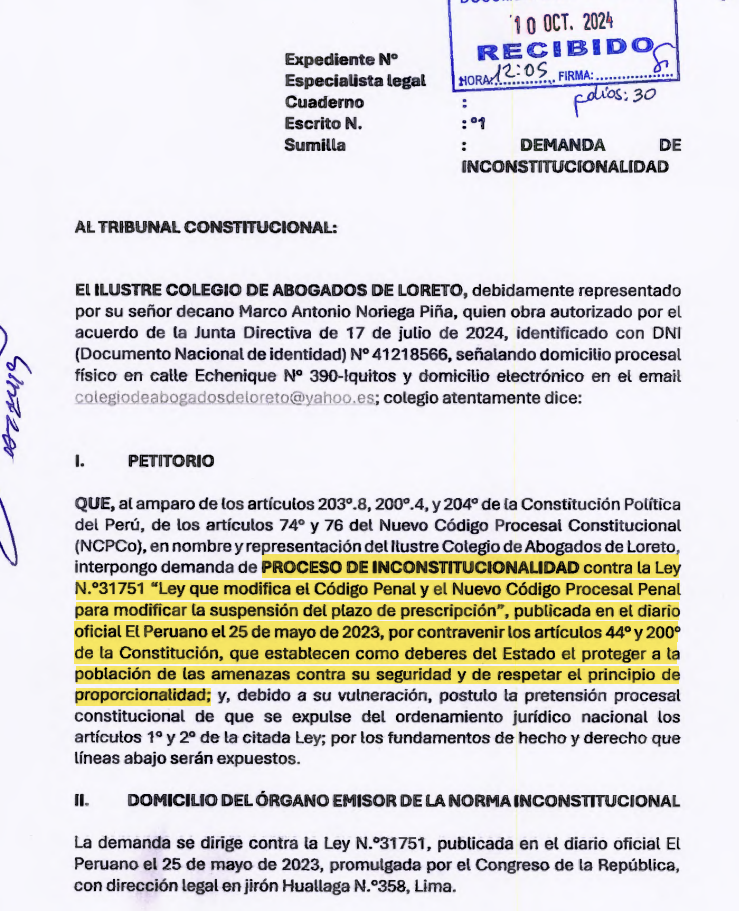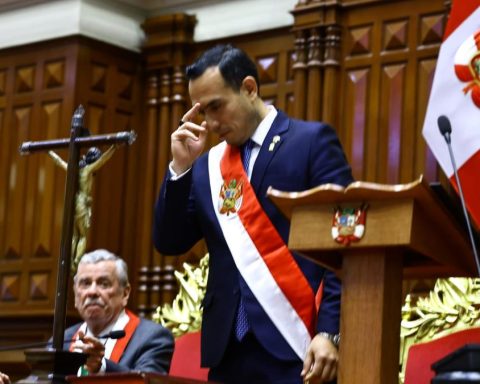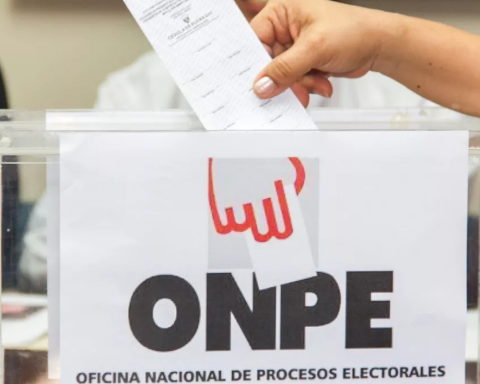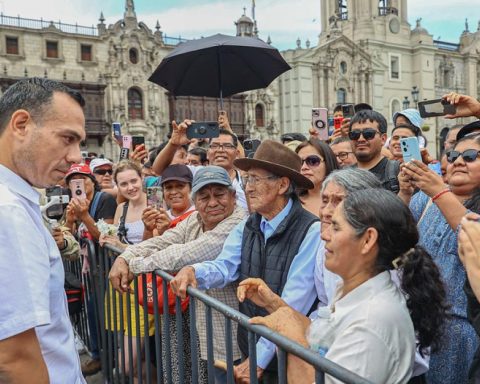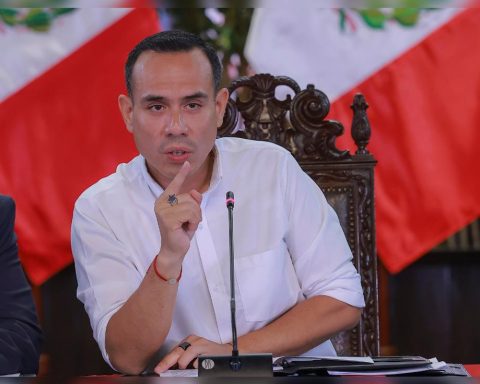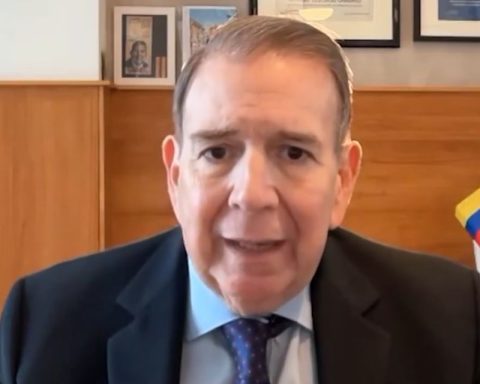He Loreto Bar Association took the step that, to date, the Judiciary: file a claim of unconstitutionality against the Law 31751the infamous Soto Law. This rule made it easier for criminal proceedings against political figures to expire by reducing the period of suspension of the statute of limitations to one year.
For example, before the Soto Lawa process for the crime of simple collusion, whose maximum penalty is 6 years, could prescribe at 18 years (9 years of extraordinary prescription + 9 years for suspension of the prescription) after the events occurred. However, with the Law 31751said illegal act would prescribe after 10 years (9 years of extraordinary prescription + one year for suspension of the prescription).
The Supreme Court At first it applied the new legal provision without problem. However, in November 2023, the supreme criminal judges issued the Plenary Agreement 5-2023/CIJ-112where it is concluded that the norm is unconstitutional because it goes against the Magna Carta.
After this plenary agreement, the Permanent Criminal Chamber and the Transitory Criminal Chamber of the Supreme Court They have not applied the Soto Law again, according to what was learned The Republic.
He Judiciary did not file a claim of unconstitutionality before the Constitutional Court to definitively expel the aforementioned norm from the legal system. It took about a year for an outside institution to do it. In this case, the Loreto Bar Association.
Take action
On October 10, the Loreto Bar Associationrepresented by its dean Marco Noriega Piñathe action of unconstitutionality entered the table of parties of the TC.
In the document, which this newspaper had access to, it is stated that the questioned Law goes against articles 44 and 200 of the Constitution“which establish as the duties of the State to protect the population from threats to its security and to respect the principle of proportionality.”
“The legislator (Congress), despite being aware that in our reality crime advances day by day, established a single term for the limit on the suspension of the prescription of criminal action. In good account, today the suspension period regulated in Law 31751 is the same for the crime of theft as for criminal organization crimemoney laundering, aggravated collusion, etc., which is clearly disproportionate,” the letter reads.
The lawyers’ union also mentions that the Procedural Code It contemplates different deadlines to carry out investigations depending on the complexity of the case (simple, complex, organized crime). However, this is not reflected in the Soto Law since it sets a single deadline for all processes, regardless of the crime being investigated.
“The two articles that are part of Law 31751 lack that proportionality in terms of setting the term that operates as a limit to the suspension of the prescription of criminal action. In this way, the State fails to comply with its duty to proportionally protect the population from the threats it generates against its security, such as the commission of crimes of various kinds,” the document reads.
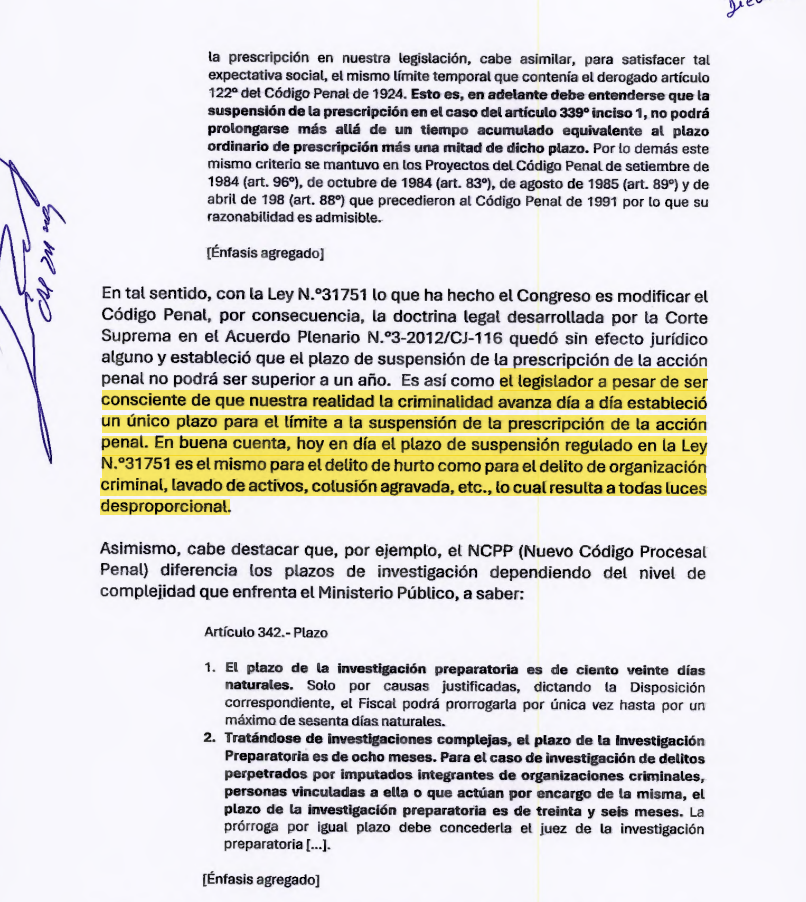
Likewise, the Bar Association highlights the Plenary Agreement 5-2023/CIJ-112but remember that the basis that declares the norm unconstitutional was not established as legal doctrine. In other words, the possibility remains open that in lower instances the Soto Law and proceedings for serious crimes continue to be filed.
“Therefore, as long as the Constitutional Court does not expel the aforementioned Law from the national legal system, its unconstitutionality will continue to generate harmful effects on the administration of justice,” the union demands.
definitive statement
It should be noted that the T.C. has spoken – briefly – about the Soto Law. In file 03496-2021-PHC/TC, the magistrates assured that Congress “observed a problem in the regulation of this institution (suspension of prescription); while the limitation periods that were in force could in some cases violate the right to a reasonable period.”
In response, the Supreme Court He said that in said ruling of T.C. The arguments of the Plenary Agreement 5-2023/CIJ-112 nor was it determined whether the one-year period is reasonable or not. Only a period for the suspension of prescription was regulated for the first time. Added to all this, the supreme judges maintain, the T.C. he did not declare his ruling as binding precedent. In other words, the debate is still open and the magistrates will have to settle it once and for all.
What’s coming
The unconstitutionality lawsuit was presented on October 10. To date it has not been admitted by the T.C.. Once this occurs, the Congress so that they can appear in the process and present their arguments. The parties will then be called to a public hearing. Finally, the T.C. issues the ruling on the case.
If the ruling is unfounded and, consequently, the constitutionality of the Soto Law is confirmed, the judges of the Judicial Branch could no longer disapply the aforementioned rule, as established in article VII of the New Constitutional Procedural Code.
